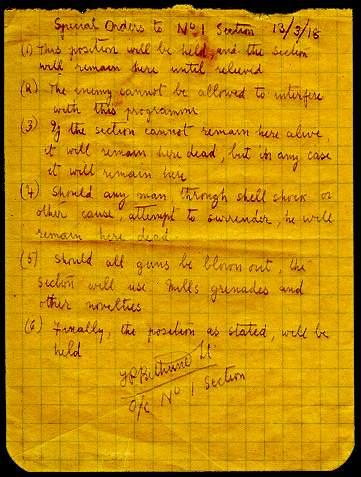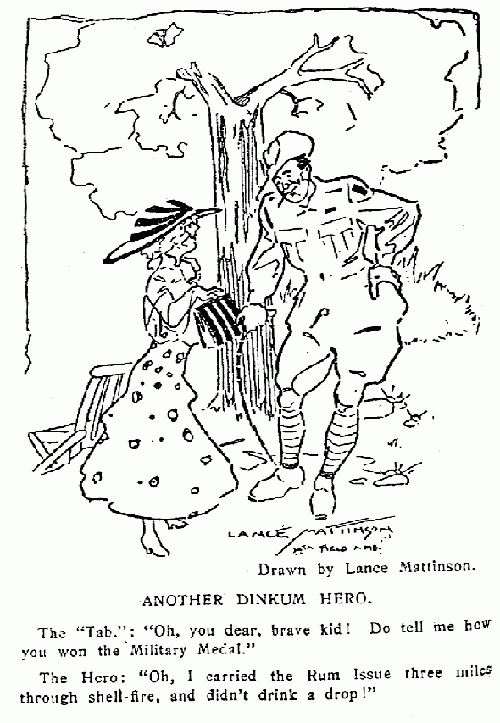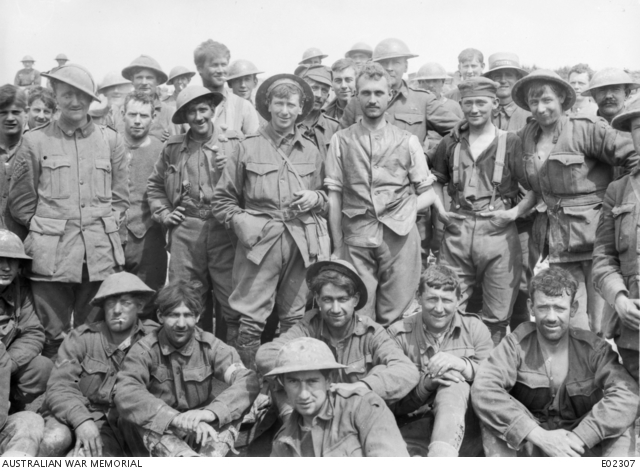1918: Australians in France - The Diggers relations with each other
A common remark made by veterans of the First World War in looking back on their experience is that what made it worthwhile was the close friendships and mates they found in the war.
JIM
We were mates, were Jim and I-
Mates right from the start,
From when we went to camp together,
Until he fell, shot through the heart.We joined the same battalion,
We trained at Seymour Camp;
And many a weary mile we marched,
Through mud, and snow, and damp.We had finished our training,
And were ordered to the front,
To join the boys out here in France,
And help to bear the brunt.We were sitting in our dugout,
A-yarning of olden times,
When the order came to "Stand-to",
We were wanted down the lines.At last the scrap was over,
Just a scrimmage, that was all,
We never even stopped one,
Though we saw others round us fall.We were sitting in a dug-out,
Just a hole dug in the ground,
With a roof made out of sandbags,
To keep the bullets off, flying round.It was one morning in December,
We were fighting in the snow,
And it wasn't the kind of fighting
That you see in the picture show.We were sitting in a shell-hole,
Out there in "No Man's Land",
Waiting for the signal to go
At 'em, man for man.We hopped in his front line trenches,
And were bombing side by side,
When a sniper's bullet copped him:
That's how my cobber died.He was just a rough Australian,
One the Frenchies call "Tres Bon",
And I miss him something awful,
And now I'm lonely now he's gone.Although I'm badly wounded,
Perhaps I'll fight no more:
We've done our best together,
Good-bye, Jimmy, "Au Revoir".
- Anonymous
Shared experiences in the face of death forged a deep comradeship and understanding between the men of a company. This is reflected in the famous battle orders issued by Lieutenant F.P. Bethune to his group of seven men in No.1 section, 3rd Machine Gun Company, when sent to defend an exposed position in March 1918:
Special Orders to No.1 Section 13/3/18
(1) This position will be held, and the section will remain here until relieved.
(2) The enemy cannot be allowed to interfere with this programme.
(3) If the section cannot remain here alive, it will remain here dead, but in any case it will remain here.
(4) Should any man, through shell shock or other cause, attempt to surrender, he will remain here dead.
(5) Should all guns be blown out, the section will use Mills grenades and other novelties.
(6) Finally, the position as stated, will be held.F.P. Bethune Lt
O/C No.1 Section
Even though Bethune may not have expected his orders to have been obeyed to the letter, he had enough knowledge of and confidence in his men to be able to write such an order:
… not only was such a thing as surrender to the enemy an impossibility to such men as these, but … they knew that I knew they could not consider such a possibility, and so between us we enjoyed, in silence, the joke that, to an outsider, might have seemed a little grim.
Sharing their particular brand of humour, it was the sense of spirit and friendship between Australians that provided the support and strength to get through the realities of daily life during the war.
I got a shell splinter through my tin hat- fortunately it wasn't on my head at the time. I was very annoyed but my mate, Snow, couldn't see what I was upset about. He said the hat had never contained anything of value!
- Diary entry, Gunner J.R. Armitage, 9 August 1918.
In mid-August, Gunner J. R. Armitage wrote the following story:
One day Bombardier Anderson M.M., a battery galloper came cantering along the canal bank towards us. A German shell burst in the canal beside him. It knocked them over without hurting either horse or rider but they were both thoroughly drenched and when he got to us, roared with laughter while he felt himself all over- nothing could upset that chap.
Some men described how the war changed their idea of friendship:
Before coming to this war I'd some ideas on the sanctity and stability of friendship between men, but am now quite convinced that it takes a real war to bring out all that is best or worst in any man, particularly when he expects to meet his maker at any instant.
I'm proud to the heart's core of the fact that I'm an Australian, and if ever the true story of what the fine Australian divisions have done in this war is ever truthfully told, so will you and thousands more.
- Letter, Lance Corporal A.H. McKibbin, 1918.
Captain Francis Fairweather wrote in 1918 of the great pride he had for Australian men and their professionalism:
On several occasions we have had the Divisional and other generals to see the team at work and in every case they have expressed themselves as being satisfied that we were working on right lines. The officers and men are now just at the very top of their form and I feel that all my plans and hopes are being fulfilled. It is a pleasure to see them, splendid, clean, eager and high-spirited and full of the consciousness of their superiority over the enemy. It makes one feel proud to be in command of such men.
On the way to meet German troops after their March offensive, he wrote of passing exhausted Australian troops on the road as they returned from fighting:
It makes one feel proud to be an Australian, to see our boys after all this, pass through a village singing. They are magnificent and wherever they go they inspire confidence, both in the Tommies and the French civilians ... There's no doubt but for the Australians and the New Zealanders the Boche would be going yet.
Although these attitudes were perhaps arrogant, they demonstrate that Australian soldiers were proud of what they achieved together during the war, and believed that their contribution to the Allied victory was a significant one.
A group of the 46th Battalion on 1 May, 1918, at Villers-Bretonneux, after a period of heavy fighting.
Boatloads of Australian servicemen and their friends tethered to the bank during an outing arranged by the YMCA, London, 1918.
Group portrait of the 8th Battalion . This team were 1st division premiers of the Australian Rules Competition in 1917, 1918, and 1919, and included all ranks.

Special Order issued by Lt. F.P. Bethune 1918
Text reads:
Special Orders to No.1 Section 13/3/18
(1) This position will be held, and the section will remain here until relieved.
(2) The enemy cannot be allowed to interfere with this programme.
3) If the section cannot remain here alive, it will remain here dead, but in any case it will remain here.
(4) Should any man, through shell shock or other cause, attempt to surrender, he will remain here dead.
(5) Should all guns be blown out, the section will use Mills grenades and other novelties.
(6) Finally, the position as stated, will be held.
F.P. Bethune Lt
O/C N ° 1 Section (AWM EXDOC 40)

This cartoon drawn by an Australian soldier shows how many men tried to make light of more serious issues of life in the war.


